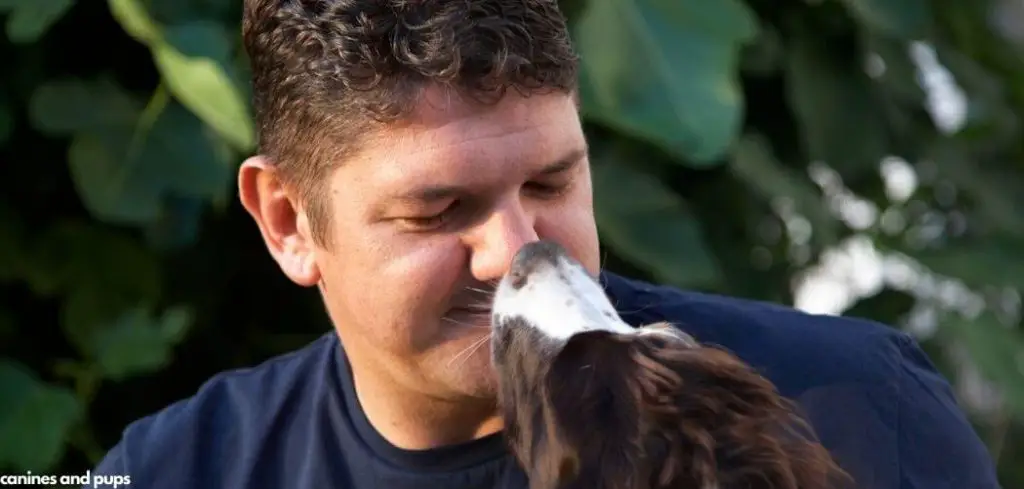If a dog is constantly licking its owner, it can be both puzzling and concerning. While occasional licks are usually a sign of affection, excessive licking may point to underlying behavioral, emotional, or even medical issues.
We outline the common reasons why a dog may excessively lick their owner, what can be done, and when to seek veterinary help.
Dog Excessively Licking Owner — Why It Happens
Dogs may excessively lick their owners for many reasons, ranging from affection and bonding to anxiety, medical issues, or even learned behavior. Sometimes it is a natural way for dogs to seek comfort or show submission. In other cases, it may signal stress, boredom, allergies, or gastrointestinal discomfort.
Because the reasons can vary, it is important to look at the bigger picture of the dog’s overall health and environment when the behavior becomes constant.

Dog Excessively Licking Their Owner: Common Causes
Affection and Bonding
Dogs often lick as a sign of affection. This instinct starts early when puppies lick their mothers and littermates.
When an adult dog excessively licks its owner, it may simply be trying to bond or express closeness. While generally harmless, this can become overwhelming if the licking is constant.
Read more: Dog Licking Me Excessively at Night (Why it happens)
Anxiety and Stress
Excessive licking can also be a sign of anxiety. Dogs that feel insecure, fearful, or stressed may use licking as a self-soothing behavior.
For example, dogs with separation anxiety might lick their owners excessively when they return home.
The licking provides temporary comfort, but it may indicate an underlying emotional issue that needs to be addressed.
Learned Behavior and Attention-Seeking
Dogs quickly learn that licking often gets a response from their owners, whether it’s laughter, petting, or even being told to stop.
Over time, this can develop into a learned habit. If the dog notices that licking gains attention, it may continue doing it excessively to engage with its owner.
Medical Conditions and Allergies
Sometimes excessive licking is linked to medical issues. Dogs with allergies, skin irritations, or even gastrointestinal discomfort may lick themselves or others as a way of coping.
If a dog persistently licks its owner and also shows signs like scratching, chewing paws, or vomiting, an underlying health condition may be involved.
Obsessive-Compulsive Behavior
In some cases, excessive licking may be part of an obsessive-compulsive disorder in dogs. This behavior goes beyond normal bonding or anxiety.
Dogs may lick objects, themselves, or their owners repetitively and intensely. This condition usually requires professional guidance to manage effectively.
Taste or Smells on Skin
Dogs have a strong sense of smell and may be attracted to scents or tastes on human skin.
Sweat, lotion, soap, or even food residue can trigger licking. While this is usually harmless, repeated licking for this reason may reinforce the habit.
What to Do
If a dog is licking excessively, start by calmly redirecting the behavior. Offer chew toys, puzzle feeders, or a brief walk to distract the dog from licking.
Consistent training can help set boundaries by rewarding calm behavior and gently discouraging licking when it becomes too much.
Providing more physical and mental stimulation can reduce licking caused by boredom or anxiety. Daily walks, play sessions, and enrichment activities like scent games can keep a dog engaged and less reliant on licking for attention.
If stress is suspected, creating a calm environment is key.
Providing a safe space, maintaining a routine, and using calming aids such as pheromone diffusers may help. For some dogs, short training sessions focusing on impulse control can also reduce licking.
For medical concerns, it is always best to consult a veterinarian. If the dog is showing additional symptoms such as scratching, hair loss, vomiting, or diarrhea, the licking may be linked to an underlying condition that needs treatment.
When to Call or Visit Your Vet
If the excessive licking is accompanied by other signs of illness—such as skin rashes, persistent itching, digestive upset, or changes in appetite—it is important to call your veterinarian.
These signs may indicate allergies, infections, or internal discomfort that requires medical attention.
Seek immediate veterinary help if the licking becomes compulsive, meaning the dog cannot be easily distracted or redirected.
Compulsive licking may point to anxiety disorders or neurological issues that need professional management.
If your dog suddenly begins licking excessively after never doing it before, this sudden change in behavior should also be evaluated by a vet. Sudden onset often signals an underlying medical issue rather than a behavioral quirk.
Read more: Dog licking me excessively (Discover what it might mean)
Key Takeaway
Excessive licking of an owner may seem like a harmless sign of affection, but when it becomes constant, it can signal behavioral or medical concerns.
By observing the context, providing enrichment, and consulting with a veterinarian when needed, owners can ensure their dog stays both emotionally and physically healthy.
Understanding the reasons behind the behavior allows for compassionate and effective solutions that strengthen the human-animal bond.
